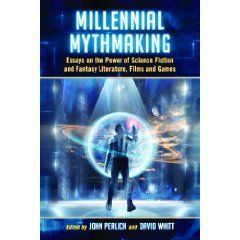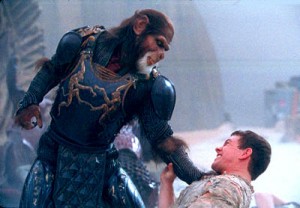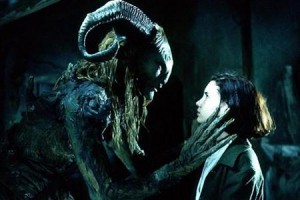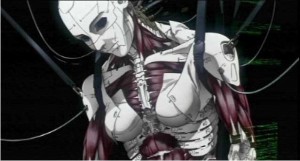 In the past I had an opportunity to interview David Whitt and John Perlich with the first book they co-edited, Sith, Slayers, Stargates and Cyborgs: Modern Mythology and the New Millennium (Peter Lang Publishers, 2007). Dr. David Whitt is Associate Professor of Communication at Nebraska Wesleyan University, and Dr. John Perlich is Associate Professor of Communication at Hastings College in Nebraska. Now they return to discuss their new book, Millennial Mythmaking: Essays on the Power of Science Fiction and Fantasy Literature, Films and Games (McFarland, 2010).
In the past I had an opportunity to interview David Whitt and John Perlich with the first book they co-edited, Sith, Slayers, Stargates and Cyborgs: Modern Mythology and the New Millennium (Peter Lang Publishers, 2007). Dr. David Whitt is Associate Professor of Communication at Nebraska Wesleyan University, and Dr. John Perlich is Associate Professor of Communication at Hastings College in Nebraska. Now they return to discuss their new book, Millennial Mythmaking: Essays on the Power of Science Fiction and Fantasy Literature, Films and Games (McFarland, 2010).
TheoFantastique: John and David, thanks for coming back to discuss your latest exploration of myth and science fiction. This is your second exploration of this topic. What did you want to do differently, or perhaps expand upon, with this second foray into science fiction myth?
John Perlich: With each volume we’ve been slowly moving toward more unusual or unorthodox texts (films, programs, artifacts, etc). Because this project is post-structural in nature, it is important to look for subjects of analysis that can be “under the radar” per se. Usually the conventional ends up getting lots of acceptance and attention—so we’ve taken some interest in either deconstructing popular texts to illustrate a potential fly-in-the-ointment or analyzing a hidden-gem to reveal the inner beauty.
David Witt: I don’t see this volume being radically different from the first, but it is a little more unique. When the chapter proposals started coming in there were the popular mythic texts like The Lord of the Rings, The Chronicles of Narnia, and the NBC TV show Heroes. However, I remember we were especially intrigued with texts like the videogame Second Life and the complexity of evil exhibited in the book and musical Wicked. So, the book just naturally gravitated toward including more unusual subjects.
TheoFantastique: Myth is studied at times in connection with ancient civilizations and religion, but you suggest there is something significant here in understanding the modern period. Can you say a few words about the significance of modern myth in your view, and why science fiction is an important expression of this?
David Whitt: In my chapter I quote French poet and novelist Raymond Queneau who said “One can easily classify all works of fiction as descendants of [Homer’s] The Iliad or The Odyssey.” If he is correct then all genres, including science fiction and fantasy, have drawn upon Homer epic mythic poem for inspiration. In this way mythology, and certainly not just Greek mythology, is timeless and continually influential. For example, last week I read Cormac McCarthy’s Pulitzer Prize winning “The Road” and was struck by how this post-apocalyptic story is a variation on the hero’s journey. Since being immersed in comparative mythology the past several years as an editor and writer I’ve seen mythic tropes in everything from comedy to drama.
John Perlich: It has been argued by Joseph Campbell himself that there are no new myths but that assertion is often taken out of context. In fact, myths are retold and reinvented—leaving the possibility for new myths (or at the very least a myth/tale/archetype that does not resemble established tales, stories, legends, and lore). You’ll often find that science fiction is a powerful medium for telling new tales while simultaneously challenging existing structures and templates. We’ve hit on this issue in the previous volume from a variety of angles ranging from the cyborg themes (in David’s chapter) to “new” heroes (and heroines). Fantasy and science fiction allow for an expansion (if not a reconfiguration) of old boundaries.
 TheoFantastique: I’d like to ask a few questions from a sampling of the chapters by contributors that were of most interest to me. Planet of the Apes is my favorite sci fi film franchise so I was naturally attracted to Richard Besel and Renee Smith Besel’s chapter “Polysemous Myth: Incongruity in the Planet of the Apes“. While I greatly appreciate the body of Tim Burton’s work, I was less than happy with his 2001 reimagining of The Planet of the Apes. The Apes myth did not work as well in the new cultural context of the early 21st century as it did in the late 20th. Besel and Besel suggest that one of the reasons for the decline in popular and critical success in contrast with the original film was its lack of interpretive depth. In what ways have viewers found hermeneutical depth in the original film, and how was this different with Burton’s version?
TheoFantastique: I’d like to ask a few questions from a sampling of the chapters by contributors that were of most interest to me. Planet of the Apes is my favorite sci fi film franchise so I was naturally attracted to Richard Besel and Renee Smith Besel’s chapter “Polysemous Myth: Incongruity in the Planet of the Apes“. While I greatly appreciate the body of Tim Burton’s work, I was less than happy with his 2001 reimagining of The Planet of the Apes. The Apes myth did not work as well in the new cultural context of the early 21st century as it did in the late 20th. Besel and Besel suggest that one of the reasons for the decline in popular and critical success in contrast with the original film was its lack of interpretive depth. In what ways have viewers found hermeneutical depth in the original film, and how was this different with Burton’s version?
John Perlich: As you quite accurately pointed out, the milieu surrounding the original film accounted for a tremendous resonance between the audience and the themes in the movie—and Rich and Renee have done a great job articulating this premise. As I read Rich and Renee’s chapter I found myself saddened by the opportunity that was squandered when this film was remade. I don’t want to give away too much of their chapter so I can’t say more.
David Whitt: Burton had the unenviable task of trying to remake a classic film which was a reflection of its time, the socio-cultural tensions of the 1960s. I was certainly intrigued by the idea of remaking Planet of the Apes for the new millennium, but as you said, the themes of race and social conflict just didn’t resonate as well thirty plus years later.
TheoFantastique: Besel and Besel comment on the confusing ending of Burton’s Apes film. As a viewer who has watched it several times in an effort to figure it out, but has still come up empty, can you shed a little light on it? Is this a case of trying to live up to the now iconic ending of the original but which fell short?
David Whitt: I remember walking out of the theater and saying “That ending makes no sense within the context of the film!” Nobody has convinced me otherwise. Clearly, Burton was trying to go for the shock value of the original ending, but came up with one that left the audience scratching their heads.
John Perlich: I don’t have any additional insight on that ending, John—but I cannot confess to spending much time trying to figure it out. It does say something in my opinion that I wasn’t committed to making sense of the text. Other films, for example Memento, have brought me back repeatedly to solve the puzzle of an unusual ending. I was not equally compelled by Burton’s work.
 TheoFantastique: John, your chapter addresses one of the great fantasy films of the last few years in “Rethinking the Monomyth: Pan’s Labyrinth and the Face of a New Hero(ine)”. Can you share a few examples of how Guillermo del Toro has challenged or redefined the hero of myth and fantasy through Ofelia/Princess Moanna as the heroine in a new form of monomyth?
TheoFantastique: John, your chapter addresses one of the great fantasy films of the last few years in “Rethinking the Monomyth: Pan’s Labyrinth and the Face of a New Hero(ine)”. Can you share a few examples of how Guillermo del Toro has challenged or redefined the hero of myth and fantasy through Ofelia/Princess Moanna as the heroine in a new form of monomyth?
John Perlich: I am so absolutely delighted that you share my admiration for that film! I hope my piece compels every reader to watch del Toro’s work. By his own admission, Campbell’s work in articulating the monomyth often leaves a place of mutedness with regard to the female protagonist. Although Campbell contends that women can also travel the path of the heroic journey, his articulation of that process is vague and not well-defended. This is clear when you read his famous interview with Bill Moyers. Not only is Ofelia a willful and disobedient heroine, her age should preclude her from this epic adventure in many ways. Ofelia, as a girl, confronts challenges that resemble stages in the monomyth—but these stages must be recast as a result of the makeup of del Toro’s protagonist. Again, it is a fantastic film and I encourage your readers to check out both the film and my analysis of this fine work.
David Whitt: John’s chapter is a brilliant and incredibly thorough analysis of Pan’s Labyrinth. I think he could have easily written another twenty pages without even thinking about it.
TheoFantastique: What are the implications of del Toro’s depiction of the heroine for girls and young women looking to contemporary myth as inspiration?
David Whitt: Aside from John’s concern about violence, I think young girls can draw inspiration from Ofelia. In the face of great danger and horror, in both the real world and the fantasy world, she exhibits remarkable bravery and intelligence. What’s not be inspired by?
John Perlich: My concern, as mentioned in the chapter, is that the violence of the film might preclude them from seeing this fine work and thus drawing from both Ofelia’s journey and character for inspiration.
 TheoFantastique: Jay Scott Chipman discusses myth and posthumanism in “So Where Do I Go From Here?: Ghost in the Shell and Imagining Cyborg Mythology for the New Millennium”. Why does Japanese culture express a great volume of cyborg mythology through various media, particularly in manga and anime as in Ghost in the Shell?
TheoFantastique: Jay Scott Chipman discusses myth and posthumanism in “So Where Do I Go From Here?: Ghost in the Shell and Imagining Cyborg Mythology for the New Millennium”. Why does Japanese culture express a great volume of cyborg mythology through various media, particularly in manga and anime as in Ghost in the Shell?
John Perlich: I’d hate to be stereotypical in a prognosis but it seems to me that each culture might dwell on some archetypal themes as a result of cultural and historical forces. It is well documented that the aftermath of World War II and the birth of the atomic age has had a profound impact on the literature and art produced in Japan. I think the proliferation of cyborg mythology is an extension of this milieu.
David Whitt: I was fortunate to visit Tokyo last spring and witnessed firsthand Japan’s celebration of technology. Certainly John is correct with the claim that the nuclear age had a great impact on the cultural consciousness of the country. However, it’s more than that. Chipman explains how the Japanese have historically embraced technology for centuries, tracing narratives about artificiality back almost 500 years. So, you could argue that appreciating the technology and the merger between humanity and machine is part of Japanese culture.
TheoFantastique: With the continued exploration of cyborg themes in science fiction, in Surrogates, for example, do you see a continuing need for the exploration of this mythic thread in the genre? If so, how might the cyborg myth help us understand ourselves, our increasing interconnection with technology, and the possibility of the posthuman?
David Whitt: I have yet to see Terminator Salvation or James Cameron’s Avatar but their box office popularity seems to suggest a public intrigued with posthuman existence (or perhaps audiences just like to see things blown up). The merger between technology and humanity is unavoidable, but what we should be concerned about is how this impacts our individuality, and those qualities which make us human. Besides, I believe that everyone already is a cyborg (in one way or another), and welcome any text which continues to explore our inevitable cyborg development.
TheoFantastique: Thank you again for delving again into the area of myth and science fiction. I hope that both books are successful, and that perhaps there might indeed be a future volume to complete a trilogy.





2 Responses to “Whitt and Perlich: Science Fiction, Fantasy, and Millennial Mythmaking”